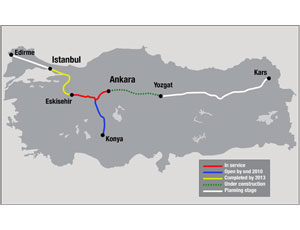Turkish State Railways’ (Turkiye Cumhuriyeti Devlet Demiryollari, or TCDD) plans to build a 6,000-kilometers network of high-speed track have received a major boost from China. Chinese Premier Wen Jiabao signed an agreement in early October in Ankara to loan approximately $28 billion for construction of a 2,000-km high-speed Silk Road Railway. The route will connect Edirne, which is on Turkey’s western border with Bulgaria, and Kars, which is in the northeast near the closed border of Armenia. The Kars–Tbilisi–Baku conventional railway—which links Turkey, Georgia and Azerbaijan—has been under construction since 2007 and is scheduled for completion by 2012.
Officials at TCDD told ENR the Chinese agreement has been approved by the Turkish Council of Ministers but most likely will not come into effect until after the 2011 midyear elections. It is expected that China will seek preferential terms for Chinese firms to supply the trains and work together with Turkish companies on the engineering and construction of the new lines.
China already has the world’s longest high-speed-rail network with nearly 7,500 km of passenger lines in service. The country has become a force in the high-speed train sector worldwide by improving on technology from train-makers such as Siemens, Alstom, Bombardier and Kawasaki Heavy Industries. China is the first and only country to have commercial train service on conventional rail lines that can reach 350 km/h (217 mph).
The unprofitable Turkish State Railways forecasts the implementation of high-speed lines will put the agency in the black within the next decade, following the example of state railway companies in Spain, Germany and France. The first stretch of high-speed line now is operating between the capital Ankara and, to the northwest, Eskisehir; a second line—from Ankara to Konya—is set to open by the end of the year. Work continues on the Eskisehir-Istanbul segment, which is scheduled to be completed by 2013. Infrastructure works are under way for the Ankara-Yozgat portion of the high-speed line, which passes through Sivas.
TCDD’s Nov. 5 pre-qualification tender for the construction of the 75-km of high-speed rail track between Bursa and Yenisehir, part of the Eskisehir-Istanbul line, attracted interest from 18 competitors. Bidders include four Italian companies (Astaldi SPA, Condotte SpA, Salini Construttasi SPA and Coopsette of Reggio Emilia), three Chinese firms (China Zhongtie Major Bridge Engineering Group Co. Ltd., China Railway Construction Corp. Ltd. and China Tiesjihu) and four Russian companies (Transmekhstro., Transyujstory, Moskovskiy Metrostroy and Transstroy ?? Ortakl???).
TCDD is courting other countries with advanced railway systems as well. A second cooperation agreement was signed in Rome on Nov. 3 with Ferrovie dello Stato, the Italian State Railways, calling for cooperation in the areas of technology, infrastructure, high-speed train projects, logistics, security, signalization and other areas. The two sides agreed to act jointly regarding projects in third countries, specifically in countries bordering Turkey; increase the level of cooperation regarding high-speed rail and European Union projects; and ensure the participation of Turkish and Italian contractors and suppliers on these projects. The first agreement was signed in December 2009.
The bulk of Turkey’s railway lines were constructed during the Ottoman era for military purposes. The rail network was expanded during the first three decades of the Turkish Republic (1923-1950) but languished until new investment started in 2002.


Post a comment to this article
Report Abusive Comment